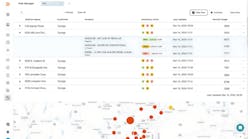Hand said there is a hiring conundrum in screening and qualifying new-driver applicants through PSP, a new program mandated by Congress to assist the motor carrier industry in assessing the individual driver's crash and serious safety-violation history as a pre-employment condition.
“It's called ‘voluntary,’ but I think it might end up being almost mandatory because of the repercussions,” he said. “PSP contains Driver Information Resource (DIR) records on individual drivers. So there will be a source out there that will capture all data obtained through CSA 2010 on each driver. Requests are made through NIC Technologies for this information, and data is from Motor Carrier Management Information System (MCMIS).
“FMCSA says you must have driver authorization, and it can only be obtained for pre-employment screening. It contains five years of crash data and three years of roadside inspection data from the FMCSA. FMCSA says the raw data that will be available to carriers and drivers in the PSP is the same data used in the Driver Safety Measurement System (DSMS), but it does not provide a score or assessment from the FMCSA.”
The cost for carriers with less than 100 power units is a $25 annual fee, plus $10 per record. Carriers with more than 100 power units will pay a $100 annual fee, plus $10 per record.
Hand said FMCSA called DSMS a “tool that enables enforcement personnel to assess individual drivers according the new Behavior Analysis and Safety Improvement Categories (BASICs) scheme.” Law enforcement will use this tool to examine the safety performance of drivers when they conduct CSA 2010 carrier investigations.
New hire investigation
He said FMCSR 391.23 requires each motor carrier to make the following investigation within 30 days of hire: three years of driving record from the state where the driver held a driver's license and three years of employment record. He said carriers typically obtain MVRs and reports from services such as DAC and USIS.
“Should you add PSP to the list, although it's not specifically required by the regulations?” he said. “What additional information would you obtain from the PSP?”
He said the BASICs program targets the following:
-
Unsafe Driving. Operation of commercial motor vehicles (CMVs) in a dangerous or careless manner (speeding, reckless driving, improper lane change, and inattention).
-
Fatigued Driving. Operation of CMVs by drivers who are ill, fatigued, or in non-compliance with hours-of-service (HOS) regulations (log violations, illness, or fatigue).
-
Driver Fitness. Operation of CMVs by drivers who are unfit to operate a CMV due to lack of training, experience, or medical qualifications (failure to have a valid CDL and being medically unqualified).
-
Controlled Substances and Alcohol. Operation of CMVs by drivers who are impaired due to alcohol, illegal drugs, and misuse of prescription or over-the-counter medications.
-
Vehicle Maintenance. CMV failure due to improper or inadequate maintenance (brakes, lights, and other mechanical defects, and failure to make required repairs).
-
Improper Loading/Cargo Securement. CMV incident resulting from shifting loads, spilled, or dropped cargo, and unsafe handling of hazardous materials (improper load securement, cargo retention, and hazardous material handling).
-
Crash Indicator. Histories or patterns of high crash involvement frequency and severity based on information from state-reported crash reports.
Next Page: Evidence of violations
Keeping records continued...
“What you have to keep in mind when making the decision on whether to sign up for PSP is that you're trying to hit a moving target. You have to be thinking about what a jury or judge would find regarding what a ‘reasonably prudent trucking company would do,’ ” Hand said. “It'd be nice to know exactly what you're supposed to do, because you would do it. What's challenging is that in each individual case, this target moves. Often times following the regulations is not necessarily enough.”
“Plaintiffs almost always add this claim in personal injury suits,” he said. “Failure to enroll in PSP could impact the ‘should-have-known’ standard if you chose not to enroll.”
Evidence of violations
In Burke vs TransAm Trucking (2009), the claim for punitive damages was thrown out because the plaintiff did not have evidence of specific violations beyond FMCSA downgrading the carrier from a “satisfactory” to “conditional” rating. It was held that violations of the regulations are not, alone, a sufficient basis for punitive damages. There must be some nexus between the violations and the cause of the accident showing reckless indifference to the rights and welfare of others, Hand said.
He said prior court decisions on SafeStat shed light on how CSA 2010 might be used in future litigation.
In Shram vs Foster (2004), a case against a broker for negligent hiring of a motor carrier, the court held that the duty of the broker was to use reasonable care in hiring carriers, including at least: checking the SafeStat database; and maintaining records on the carriers used to assure the carriers are not manipulating their business practices to avoid unsatisfactory SafeStat ratings. Hand said CSA 2010 data could be used in a similar fashion regarding the hiring of drivers and motor carriers.
In Doyle vs Watts Trucking (2007), where there was an accident involving allegations of “sleep deprivation” against the truck driver and vehicle maintenance against the carrier, the court allowed into evidence various safety reports from the FMCSA, including SafeStat data showing that the carrier regularly violated HOS rules and violated the regulations on brakes and tire tread depth. The defendant objected on relevance grounds, but the court allowed the evidence. CSA 2010 data will contain similar information.
Jones vs CH Robinson (2008) involved a plaintiff injured in a trucking accident by a carrier hired by a broker, CH Robinson. The carrier had a “conditional” safety rating and was hired by CH Robinson, with the contract requiring that the carrier maintain a “satisfactory” safety rating. The court held there was enough evidence for the jury to decide whether Robinson breached its duty to select a competent carrier. Hand said carriers with “marginal” ratings can expect the same.
“If you don't get the PSP/DIR reports, the plaintiff probably will,” he said. “Like medical records, criminal records, and traffic records, plaintiffs can use the subpoena power of courts to obtain the DIR report. Pre-suit, plaintiffs will likely use the Freedom of Information Act. I have not seen anything to the contrary. Plaintiffs will get this information, despite the FMCSA's statement that it is not available to the public and solely for pre-employment screening.
“From a litigation standpoint, it's difficult to tell a jury why you did not enroll when carriers always say, ‘Safety first”; for $10, you see the full report (the plaintiffs' standard argument is profits over safety). The government says the system will help employers make more informed decisions when hiring commercial drivers. There is much more detailed information than MVRs and DAC reports; and the raw data is designed to “examine the safety performance” of drivers.
“If you choose not to enroll in PSP, be prepared to explain to a jury why,” he said.
Hand also addressed today's electronic data storm that can contain make-or-break evidence in the forms of e-mails, on-board computer data, electronic control module data, electronic logs, computer maintenance and driver files, and cell phone records (calls, text messages, and photos).
“Avoid a spoliation charge and preserve data that proves your case,” he said. “Once litigation is anticipated, anything relevant to the litigation should be preserved. The rules require a party to act affirmatively in preventing destruction or alteration of potentially relevant information.
To satisfy this duty, you should suspend the normal business practice of purging records if litigation is reasonably anticipated. Develop and follow record retention policies, along with retention policies in the event of an accident.
(Continued on next page)Keeping records continued...
The regulations on record retention: HOS records, six months; maintenance records, one year (six months after selling a vehicle); drug and alcohol testing — clean test, one year, dirty test five years; driver qualification files, three years; accident register, one year after the accident.
“Simply following the FMCSR on record retention is rolling the dice,” he said. “The general rule is that litigants have a duty to preserve documents that may be relevant to potential future litigation. You should preserve when you have notice that evidence is relevant or when a party should have known that the evidence may be relevant in future litigation. The law requires more than following the regulations when litigation is reasonably anticipated.”
He said spoliation is defined as “the destruction or significant alteration of evidence, or failure to preserve property for another's use as evidence in pending or reasonably foreseeable litigation.” He said an example would be logs that would have shown HOS violations.
In Darling vs JB Expedited Services (2006), there was a fatality accident on February 12, 2004. On March 4, 2004, the plaintiff's attorney sent a preservation letter. The carrier saved only logs for seven days before the accident, but purged all other logs after six months, so the plaintiff alleged spoliation. The carrier argued that the regulations required holding logs for only six months, but the court ruled that the motor carrier had a duty to preserve the logs beyond that period.
In Montemayor vs Heartland Transportation (2008), a truck accident May 6, 2006 resulted in injuries. Driver logs were destroyed six months after the accident as part of normal procedures. DDEC data was not kept for the accident, and the truck sold prior to the lawsuit. The safety director testified she did not anticipate litigation until notice of the suit, which was filed 17 months after the accident. Trucking company interrogatory answers said litigation was anticipated the day after the accident. Company policy was to retain logs longer than six months in the case of an accident with bodily injury, a tow, a citation to the truck driver, or if told to so.
The court held that since the safety director's testimony suggested the possibility that policies were not followed when the logs were destroyed, the spoliation charged survived.
“Because the carrier's policy for preserving DDEC data was not clear, and data from the truck regarding other dates was kept before the unit was sold, the spoliation charge survived,” Hand said. “The Catch-22: A decision on when to ‘anticipate litigation’ to protect investigation or risk a charge of spoliation.”
In Frey vs Gainey Transportation (2006), there was a truck accident with injuries on November 10, 2003. The plaintiff's attorney sent the safety director a preservation letter 10 days later. Qualcomm records were not preserved; the safety director testified that the incident was not serious enough, judging from the plaintiff's conduct after the accident, to preserve the Qualcomm data.
The court found data irrelevant to the claims asserted (negligent supervision, unsafe practices). Ninety days after the accident, the data was automatically deleted in the normal course of business. The court noted the prudent course of action would have been to preserve the data, but balanced the low level of evidence value with the conduct.












